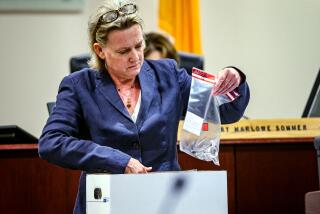Nieves Trial Judge Denies Bias Accusation
Responding to a defense effort to remove him from the case, the judge presiding over the murder trial of a woman accused of killing her four daughters through arson has filed court papers arguing that he should remain.
“I am not prejudiced or biased against or in favor of any party to this proceeding or their counsel,” wrote Los Angeles County Superior Court Judge L. Jeffrey Wiatt in a signed statement dated Friday. “All rulings made by me in this action have been based upon facts and arguments officially presented to me and upon my understanding of the law.”
Two weeks ago, Deputy Public Defender Howard Waco, who is representing Sandi Nieves, filed a motion to disqualify Wiatt, saying he has shown favoritism to prosecutors, rebuked Waco in front of jurors and mistreated some defense witnesses. So far during the trial that began 2 1/2 months ago, Wiatt has sanctioned Waco at least seven times, mostly for making inappropriate objections and statements, and has fined him more than $3,000.
Nieves, 36, allegedly started a fire in the early morning of July 1, 1998, as her five children slept in their Saugus house. Her daughters, Kristl and Jaqlene Folden, 5 and 7, and Rashel and Nikolet Folden-Nieves, 11 and 12, died of smoke inhalation. Her teenage son, David Nieves, survived. The mother is charged with four counts of first-degree murder, attempted murder and arson.
Prosecutors contend Nieves killed her children out of desperation and desire for revenge against the men in her life. Her defense argues she was legally unconscious at the time of the fire. Nieves faces a possible death penalty if convicted.
Waco’s motion was unusual, legal experts said, because it was brought in the middle of trial. If granted, it would cause a mistrial, but legal experts did not expect it to succeed.
Across the country, there have been occasions when motions to disqualify judges have been granted during trial, but they’re rare, according to legal experts. Typically, those cases involved racial or gender bias.
Here in Los Angeles County, no such motion has been granted in the middle of trial for at least 15 years, said court counsel Frederick R. Bennett, who is representing Wiatt. That’s because most people who file them should really be taking their grievances to the appellate court, Bennett said. Otherwise, parties would regularly attack judges’ rulings by motions to disqualify rather than through the appeals process.
Judicial Council, the policymaking arm of the California Supreme Court, will appoint a court in another county to hold a hearing on the matter, Bennett said. The process usually takes six weeks. Thus, the decision will probably be made long after the trial has ended.
Legal experts said they think Waco’s motion is really a tactic to strengthen grounds for a later appeal, but the attorney disagrees.
“We just want an impartial judge,” Waco said. “My biggest concern is that the judge wears a black robe, and the court’s demeanor may lead the jury to believe that I’m not worth listening to.”
Deputy Dist. Atty. Beth Silverman called Waco’s motion a “desperate” move by someone “trying to divert the attention and place the blame on someone else” because his trial isn’t going well.
More to Read
Sign up for Essential California
The most important California stories and recommendations in your inbox every morning.
You may occasionally receive promotional content from the Los Angeles Times.









